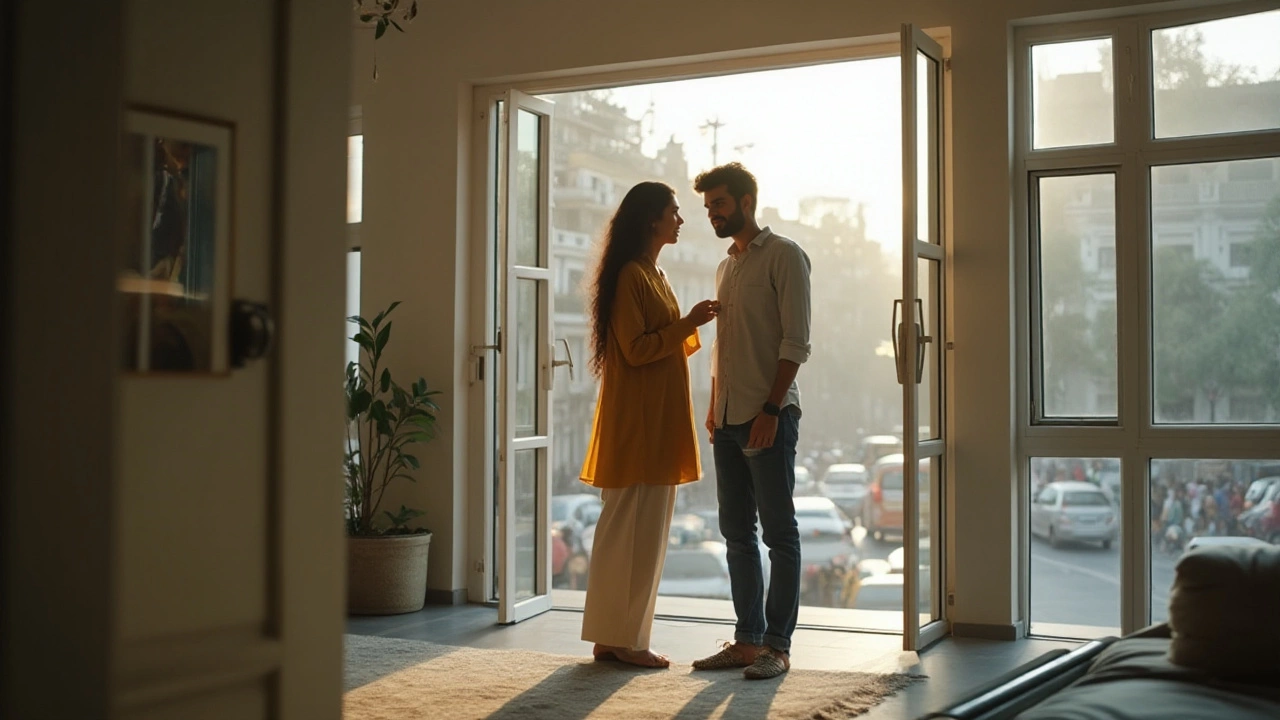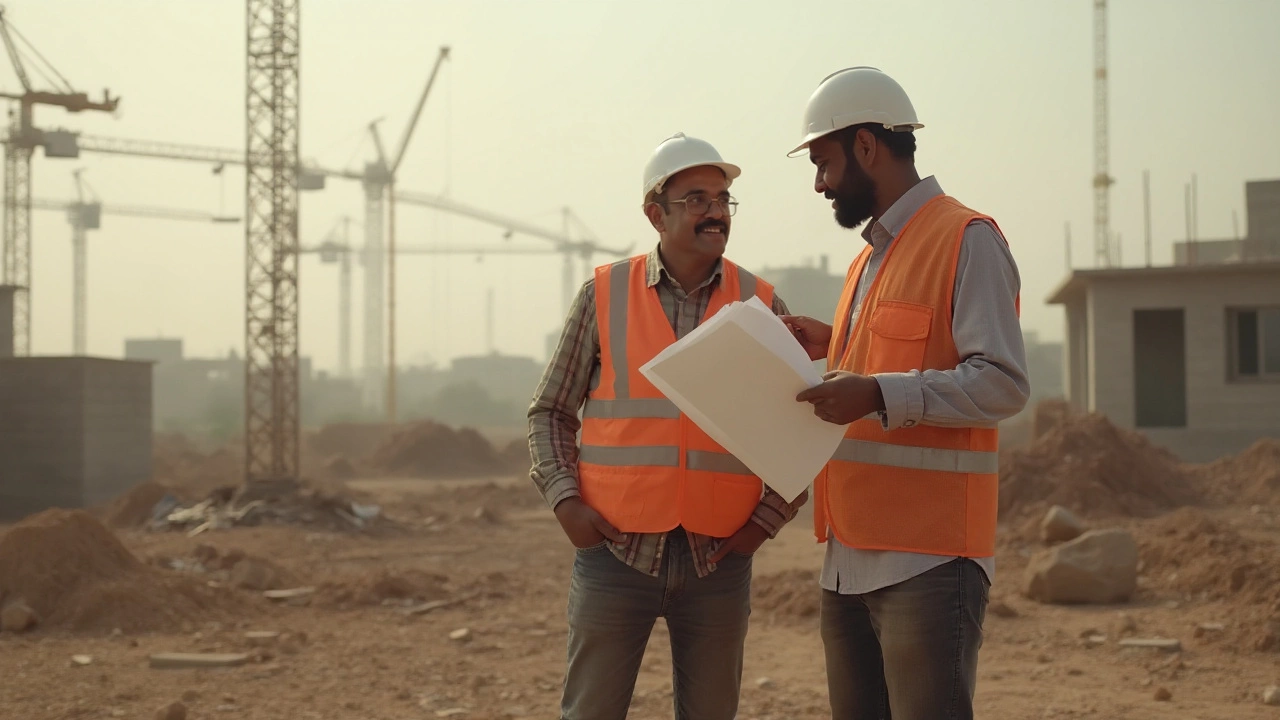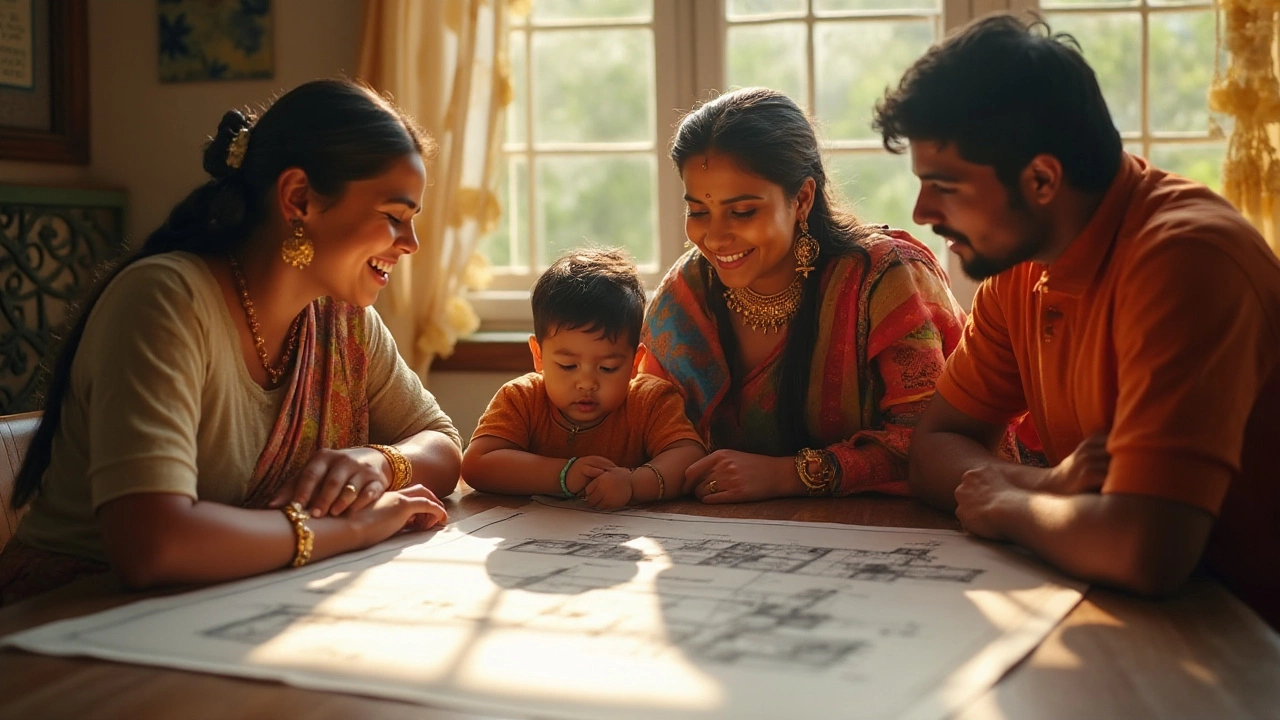Navigating the decision of whether to build or buy a home is an adventure filled with big dreams and critical considerations. With the real estate landscape evolving yearly, understanding the nuances behind both options becomes essential. A home is more than just a property; it's a place where life unfolds, memories are crafted, and comfort reigns somewhere in the future.
Throughout this discussion, we'll explore the cost differences between building and buying, recognize timelines involved, and peek into how personal taste can shape your decision. As we journey through these different perspectives, connecting economic factors and heartstrings, you'll find yourself closer to choosing a place you can wholeheartedly call home.
- Cost Comparison: Buying vs. Building
- Timeframes and Logistics
- Customization and Personalization
- Financial Implications and Long-Term Value
- Impact on Lifestyle and Preferences
- Tips for Making the Right Decision
Cost Comparison: Buying vs. Building
The debate of whether to construct a new home or purchase an existing one primarily boils down to financial considerations. When you buy an existing home, you often pay a premium for convenience. A ready-made option means skipping construction headaches, moving in faster, and knowing your neighborhood's vibe firsthand. In 2024, the median cost to buy a home in the United States hovered around $400,000, a figure which includes the land and the dwelling itself. For many, this price is simply the sticker shock, as additional costs such as closing fees, potential renovations, and unforeseen repairs can start piling up soon after the deal is sealed. Not to mention, pre-existing homes come with features and designs molded by former tastes, which might not always align with your vision.
On the flip side, embarking on the journey of building a house ushers in its own set of financial intricacies. The primary allure of building is the customization and personalization it offers. You get a chance to craft the walls according to your heart's desire, from floors to finishes. However, with this freedom comes a cost. Engineering studies, permits, and the land purchase are just the start. The myriad of decisions you'll make—be it labor, materials, or the developer's fee—adds up exponentially. Speaking of numbers, a 2023 study showed that the average expenditure to build a house from scratch, without land, clocked in at about $289,415. However, this doesn't account for potential delays or the need for temporary housing during the construction process, which can further strain the budget.
Breaking Down the Costs
Delving deeper into these numbers, it's evident that each path has tangible benefits and hidden pitfalls. For existing homes, while they might initially seem pricier due to their final sum, they also grant predictability. Mortgage lenders usually prefer this option since it's less risky, and the market value can often be appraised accurately. You're investing in something tangible right from the outset. However, building a house means paying for each phase separately. A detailed budget must be prepared, considering expenses like architectural plans, foundation work, and utilities installation. A strategic advantage here is that you can make deliberate financial choices, allocating funds to prioritize things like eco-friendliness or space efficiency, which might translate to long-term savings through reduced energy costs.
"The decision to build or buy is often swayed by long-term vision," says Emily Siner, a senior real estate analyst, "but understanding immediate financial commitments is crucial too."
To illustrate the complexity of this choice, let's reflect on some scenarios. A locale's economic context can vastly influence your decision. In urban centers where land is scarce, buying might be the only feasible choice. Conversely, in sprawling suburbs or the countryside, where space abounds and permitting is straightforward, building becomes a compelling narrative, especially when targeting energy-efficient designs aimed at reducing future bills. In conclusion, weighing the financial implications of buying or building a home involves more than just comparing tangible numbers. It's crucial to consider personalization, future financial commitments, and the immediate conveniences or efforts associated with each path.
Timeframes and Logistics
The journey toward owning a home, whether through buying or building, doesn't just involve financial calculations but an intricate timeline management. When you choose to buy home online, the process is fairly predictable, but it’s intricacies shouldn’t be underestimated. Typically, purchasing an existing home can see you settling into your new abode in as little as a few weeks to a few months. Various factors impact this duration, including the state of the real estate market, availability of homes that suit your needs, and sometimes, the efficiency of your chosen real estate agent. The time may stretch longer if negotiations hit snags or you encounter legal or financial hurdles.
On the flip side, opting to build a house introduces an entirely different timeline. From conception to completion, this journey can take many months, sometimes even extending longer than a year depending on site preparation, weather conditions, and construction challenges. The actual building phase, where walls rise and roofs top, isn't the entire story. Design approval, permits, and securing contractors all add layers of time. People often find themselves in temporary living situations as their future homes slowly transition from blueprints to reality. However, with modern trends and technological advances, companies like Icon 3D are spearheading faster construction techniques, presenting us with an ever-accelerating industry. The notion is echoed by architect Loren Thorburn, "We are no longer tied to conventional means. Speed is catching up with imagination."
Managing these timelines necessitates precise coordination and an understanding of home construction costs intertwined with logistics. A meticulous schedule emphasizing material deliveries, contractor availability, and utility hook-ups requires foresight. In complex projects, delaying just one of these elements spirals into costly interruptions. Logistics also consider geographical constraints; more remote locations may face delays in obtaining certain materials or equipment. The task demands patience, but there's a baby-steps thrill to watching your sanctuary gradually take shape.
For those eyeing a streamlined process, several strategies exist to reduce potential hiccups. Aligning with a trusted project manager can smooth out unexpected wrinkles, keeping your dream on track. Allocate ample buffer time for unavoidable delays, ensuring flexibility in your plans. Recognize the opportunity to savor the creative process, and weigh the joy of crafting every nook and cranny against the immediacy of an existing property. As you balance time and logistics, it boils down to your priorities—these choices will distinctly shade your journey.

Customization and Personalization
Finding a place you can truly call home often involves more than walls and a roof; it's about crafting an environment that reflects your personality and lifestyle. For many, the idea of building a house offers an unparalleled level of customization. From choosing the layout to picking materials, each decision adds a unique stamp to your home. Opting to build also allows homeowners the chance to tailor every inch to suit specific needs. Whether it's a spacious home office with abundant natural light or a cozy reading nook tucked away from the hustle, building gives you the reins to make those dreams concrete. This choice can be particularly appealing for those with specific visions that don't align with existing properties available in the market.
On the flip side, buying a home sometimes limits personalization initially but with creativity, existing spaces can be transformed. While properties bought online are often ready to move into, they still offer room for innovation. Many homeowners take on remodeling projects that not only enhance aesthetics but also increase property value over time. Here, compromise often dances with opportunity as people breathe new life into rooms and landscapes. According to architect Sarah Frame, "Personalization doesn't just end with picking paint colors. It's about weaving your lifestyle into every corner of your home, no matter how big or small the changes." Embracing both options lets potential buyers and builders evaluate what best suits their vision and needs, making every decision not just about property but about home.
Whether you're looking to buy home online or considering constructing a new one, cost is just one side of the coin. Personal taste and emotional satisfaction play a significant role in the ultimate decision. Many people find joy and a sense of accomplishment in designing their homes down to the last detail, even if it's painstaking at times. Building or renovating also allows for the integration of sustainable technologies—a growing concern for environmentally conscious buyers. These innovative solutions contribute not only to the well-being of the environment but also offer long-term financial savings on energy bills.
However, for those who either lack the patience or the creative flair to tackle such projects, buying might inherently provide a quicker sense of accomplishment. With a purchased home, the groundwork is ready; it's about embellishing it with your characteristics. Personalizing an existing structure is less about starting from scratch and more about selective enhancements. It can be cost-effective without the long haul of construction timelines, offering a canvas already framed within the broader strokes of community and locality dynamics. This choice often brings immediate joy to who cannot wait to turn a house into their personalized sanctuary.
Ultimately, the choice between customization when building or personalizing when buying boils down to individual patience, creativity, needs, and often budget. While some delight in the orchestration of light fixtures, others may revel in the hunt for a property with history ready for a family’s next chapter. Whether leaning towards a fresh start with construction or the nuanced reimagining of an existing dwelling, the journey promises satisfaction for those equipped with vision and passion.
Financial Implications and Long-Term Value
From the outset, whether you choose to build or buy a home, financial considerations stand paramount. One needs to approach this decision with a calculator in hand and a keen eye on both the present expenses and future benefits. Buying an existing home generally comes with fewer immediate costs compared to building new. You pay the asking price, perhaps partake in a bit of negotiation, secure the mortgage, and you're in. Often, existing homes might even be sold below the cost of building equivalents due to market saturation and age-related influences. Transaction costs, however, like agent fees and renovation needs, should not be overlooked as they can add layers to your outgoing expenses.
In contrast, constructing a home from scratch appears daunting fiscally, but the long-term payoff can be substantial. Building offers the prime advantage of crafting a space tailored to your taste and the most current home construction costs. Efficiency aspects such as smart home features, energy-efficient designs, and top-quality materials often carry a promise of reduced future operating costs. The upfront investment leans higher, yet lower maintenance and utility bills may create savings in the years to follow. For instance, modern insulation materials, solar panels, and smart home technology can save homeowners up to 30% annually in energy expenses.
John Doe from Real Estate Today remarks, "It's not just about the costs of constructing; it's what you've built into that property for the next decade or two. High quality equates to high living value."
The resale value of both scenarios also brings an important dimension into the discussion. Existing homes, given their age, might depreciate quicker if major updates are not implemented. On the other hand, newly built homes generally appreciate as neighborhood values enhance, and the home remains under minimal depreciation strain due to its newness. Data from the National Association of Home Builders indicates that newly constructed homes maintain about 5% higher value after five years compared to their older counterparts, factoring in equitable market conditions.
Investors frequently emphasize capability for customization as a financial boon in homebuilding. Unique features such as a home office, personalized landscaping, or state-of-the-art kitchen systems resonate well within a dynamic market, effectively boosting a home's worth by accentuating attractive seller features. The capacity to align real estate investment with personal needs and evolving market demands grants significant weight to one's strategy when considering future financial returns.

Impact on Lifestyle and Preferences
When you're at the crossroads of whether to buy a home online or embark on building your dream house, considering how each choice impacts your daily life is paramount. A home is more than walls and a roof; it mirrors the life you wish to lead and the environment you want to cultivate. Whether you prioritize designing a home that aligns with every facet of your taste or gravitate towards the allure of established neighborhoods, both paths hold unique influences on your lifestyle.
A freshly built home offers customization right down to the tiniest detail, granting you the luxury to tailor spaces that cater to your specific lifestyle needs. This often appeals to those who relish the idea of owning a kitchen that perfectly complements their culinary hobbies, or a living room designed for hosting lively gatherings. Building from scratch also avails the opportunity to integrate modern home technologies seamlessly, making everyday life more efficient and enjoyable.
Choosing to buy a home online comes with its own set of advantages that might mesh well with your lifestyle. Established homes often reside in neighborhoods rich with history and community, where roots run deep, creating a sense of connection that some find irreplaceable. These homes may also be in areas with more matured landscapes, offering a charm that's difficult to replicate in newer developments. In certain real estate markets, buying an existing property can yield financial advantages, sometimes offering more square footage at a lower cost compared to new constructions.
“A home should reflect and accommodate the life that accompanies it, a delicate dance balancing dreams and reality,” remarked renowned real estate expert, Jane Rosen.
For certain individuals, the importance of location and convenience towers above other considerations. Living closer to work, schools, or city centers may dictate the decision to buy rather than build, especially if prime locations lack land for new build projects. The balance lies in understanding what daily conveniences are non-negotiable, and how each option supports these necessities. It's also worth mentioning that some people find charm in the quirks of older homes, enjoying the renovation process as part of their lifestyle, integrating the old with the new.
Ultimately, much depends on the lifestyle you envision for the foreseeable future. For those prioritizing personalization and cutting-edge amenities, building might hold more appeal. Conversely, those seeking rootedness in vibrant neighborhoods, with established schools and facilities, may find buying more suitable. Gauging your priorities, and living arrangements in line with the cost of both buying and building in your chosen area, helps carve a clearer path towards a decision that aligns with your lifestyle preferences. Real estate investments should enhance your way of life, providing a haven that marries comfort with practicality, fulfilling not just the physical aspect of living, but the intangible desires as well.
Tips for Making the Right Decision
Deciding whether to buy or build a house is akin to navigating a complex maze with several different paths. First and foremost, start by evaluating your financial situation. Look at your budget to understand the reality of your savings and what kind of mortgage you may qualify for. Knowing your financial capabilities will set the stage for making an informed decision. Are you comfortable with a fixed budget, or do you have flexibility to handle potential overspending? Building often comes with unexpected costs; whereas buying might have hidden expenses, such as repairs on outdated structures. If numbers leave you flummoxed, financial counseling might be a worthy investment to unveil the hidden labyrinth of home financing.
Next, consider how much time you can dedicate to manage either process. Evaluate how long you can spend dealing with contractors, permits, and design plans if you choose to build. On the flip side, buying a home online can expedite setting down roots but also means carefully assessing each listing, making quick decisions, and potentially competing in bidding wars. Time translates into emotional and mental investment as well. According to a report by the National Association of Realtors, buyers typically search for about ten weeks and look at a median of nine homes before purchasing. Such statistics shine some light on the time you might need to set aside for this venture.
Customization is another avenue worth exploring. If your taste tends toward the unique or you'd rather have each corner embody your personal style, building may offer the perfect canvas. Consider future plans such as family expansion, and lifestyle needs like home offices, or specific architectures that complement your taste. This level of customization can become a balancing act of creativity and budget. If you find pre-existing homes that satisfy your aesthetics or can be slightly modified through renovations, buying might be your route. As architect Frank Lloyd Wright once said:
"A doctor can bury his mistakes, but an architect can only advise his clients to plant vines", suggesting the permanence inherent in architectural decisions.
Investigate the real estate market dynamics. Presently, are prices climbing to astronomical heights or stabilizing within your preferred area? Is there speculation about future development that may enhance property values? Engage with local real estate agents to gain insights into property worth and neighborhood appreciation potentials—valuable assets when thinking about future selling prospects. You should also probe into community plans, understanding how city developments could influence your home's environment and value. Such insights arm you with the prudence to invest wisely and make decisions that shield you from unwanted surprises.
Prioritize your personal preferences and vision for a home. Envision your long-term goals. Are you seeking immediate comfort or the opportunity to craft your environment over several months or years? This decision transcends simple logic, intertwining with lifestyle aspirations. Ask yourself questions such as, "Do I wish to engage in a creative, hands-on process or enjoy a relaxed transition into an already-ready home?" Years later, looking back on your journey should spark fondness, not regret. Let your personal narrative steer the wheel, celebrating the spirit of your choice regardless of its intricacies.
Lastly, coordinate both the practical aspects and enchantment of emotions. Make them dance in harmony as you decide whether to buy or build a home. It is a personal journey seasoned uniquely by ingredients of finances, time, imagination, and practical insight. Each factor shuts doors or opens windows in its peculiar way. Melting these various components into a coherent plan results in a decision that doesn't just resonate with your current life but nourishes the dreams you cherish for your tomorrow.

